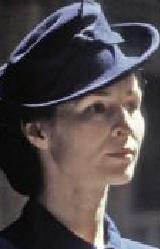SITE GUIDE
SEARCH
REVIEWS
REVIEW ARCHIVES
ADVERTISING AT CURTAINUP
FEATURES
NEWS
Etcetera and
Short Term Listings
LISTINGS
Broadway
Off-Broadway
NYC Restaurants
BOOKS and CDs
OTHER PLACES
Berkshires
London
California
Connecticut
New Jersey
DC
Philadelphia
Elsewhere
QUOTES
TKTS
PLAYWRIGHTS' ALBUMS
LETTERS TO EDITOR
FILM
LINKS
MISCELLANEOUS
Free Updates
Masthead
Writing for Us
A CurtainUp Review
After Miss Julie
|
What would you do if Daddy rang his bell and ordered you to cut your throat? You'd obey wouldn't you . . . because you must . . . because you were born to obey. Give the order, slave.
--- Julie |

Helen Baxendale as Christine
(Photo: Ivan Kyncl) |
Miss Julie becomes the daughter of a Labour Peer thrust to power in the post war election of 1945. Although the First World War is traditionally thought of as the turning point for British society starting to rid itself of its class ridden structure, the change of government in 1945 was pivotal in changing attitudes.
Marber's After Miss Julie is all about class and the disintegration of class divisions. The original play is about power and sex and money and class; Marber's emphasis is largely on the effect that changes in class have on the relationship between the manservant and chauffeur John (Richard Coyle) and the young, spoilt daughter (Kelly Reilly) of his employer. This version loses some of the peversity of Miss Julie's behaviour as sexually expressed sado-masochism. Helen Baxendale, star of television's Cold Feet plays the cook Christine in a memorable performance full of long periods without dialogue but brimming with meaning.
Michael Grandage's production reeks 1940's atmosphere which is conceived by Bunny Christie's detailed and expansive set; the large kitchen of a substantial country house, the downstairs engine house of the society upstairs dominated by the old fashioned range and the scrubbed pine table. The row of bells dangling on their circular iron spring mounts reminds us that each room in the house has the facility to summon the servants at the pull of a cord or the push of a bell. Glen Miller big band numbers are heard playing on the gramophone upstairs. The carousing revellers of the 1880 original who are celebrating the longest hours of daylight in the Scandinavian setting and who seem to upset the balance creating the conditions for Jean and Julie to consummate their desire, are replaced by almost riotous, legless drunkards coming home from the pub after toasting the Labour party election victory.
Like the original, After Miss Julie gives an unattractive, distasteful picture of a little rich girl. In fact, Strindberg's female characters are almost universally unattractive and his male ones are not much nicer. I was surprised by the casting: I had expected Helen Baxendale to play the upper class girl and Kelly Reilly the maid. Reilly's posing and pouting, fluffy nymphette seems rather too 1990s. She comes across as more nineteen than twenty five, but her sexual toying with John is well drawn. She is like a bitch in heat. In the scene where she asks that he kiss her foot, she takes it away, twice, as he gets ready to comply. When he tries to kiss her, she slaps his face. This is a dangerous game Miss Julie is playing. Did I believe her performance? Not really.
Helen Baxendale contrasts beautifully as the sterner Christine, worthy, hard working and clear about her place in society; this is a finely judged performance, as tight as her wrap around calico apron. Marber has made Christine ten years older than Julie and five years older than her fiancÚ John. Baxendale's performance implies an age weariness, an acceptance of her place that John has yet to realise. Known for her work on screen, she is mistress of this medium. I sincerely hope that her next stage performance will tax her further, because she is something special.
Richard Coyle is the man caught in the middle between these two strong-minded women. Slightly ambivalent, his ambition is inappropriate and his vision less than realistic as he sees a future in New York with Julie on reception duties in their night club. At the end of the play he looks devastated and confused nd his displacement activity? He starts to clean his master's shoes. Marber's John is a more difficult role than Jean because the resentment is more deep seated in the Strindberg.
Michael Grandage brilliantly allows long pauses in the production, time for us to appreciate the repetition and routine of Christine's working life and enter into what she must be thinking as she witnesses her fiancÚ's entanglement with Miss Julie. This is a very good production of a play that I am not particularly fond of. Even the talented Marber cannot rewrite this play to the point where its sexism ceases to push all my buttons. I have to admit that Strindberg's piece must have been amazing for its time, its modernity as futuristic as Jean's dreams of marrying his employer's daughter.
| After Miss Julie
Written by Patrick Marber from an original idea by August Strinberg Directed by Michael Grandage Starring: Richard Coyle, Helen Baxendale, Kelly Reilly Designer: Bunny Christie Lighting Designer: Neil Austin Sound: Matt Mackenzie for Autograph Running time: One hour thirty minutes without an interval. Box Office: 0870 060 6624 Booking to 7th February 2004. Reviewed by Lizzie Loveridge based on 27th November 2003 Performance at the Donmar Warehouse, Earlham Street, London WC2 (Tube: Covent Garden) |


Mendes at the Donmar
Our Review

Peter Ackroyd's History of London: The Biography

London Sketchbook

Somewhere For Me, a Biography of Richard Rodgers

At This Theater

Ridiculous!The Theatrical Life & Times of Charles Ludlam

The New York Times Book of Broadway: On the Aisle for the Unforgettable Plays of the Last Century

6, 500 Comparative Phrases including 800 Shakespearean Metaphors by CurtainUp's editor.
Click image to buy.
Go here for details and larger image.



